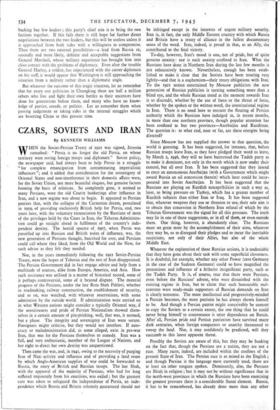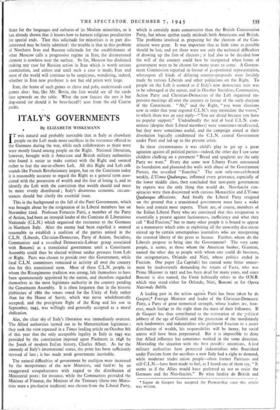CZARS, SOVIETS AND IRAN
By KENNETH WILLIAMS
WHEN the Soviet-Persian Treaty of 1921 was signed, Izvestia remarked : "Persia is no longer the old Persia, on whose territory were roving foreign troops and diplomat's." Soviet policy, the newspaper said, had always been to help Persia in a struggle "for complete emancipation from contaminating imperialistic influences "; and it added that consideration for the sovereignty of Oriental States and non-interference' in their domestic affairs were, for the Soviet Union, not mere beautiful slogans, but genuine factors forming the basis of relations. So completely gone, it seemed to many Persians, were the old Czarist hankerings after influence in Iran, and a new regime was about to begin. It appeared to Persian patriots that, with the collapse of the Curzonian dream, postulated in 1919, of providing exclusively British help for Persia, and, two years later, with the voluntary renunciation by the Russians of most of the privileges held by the Czars in Iran, the Teheran Administra- tion could go straight ahead in fulfilment of the country's inde- pendent destiny. The horrid spectre of 1907, when Persia was parcelled up into Russian and British zones of influence, was, the new generation of Persians thought, banished for ever, and Persians could call where they liked, from the Old World and the New, for such advice as they felt they needed.
Nor, in the years immediately following the 1921 Soviet-Persian Treaty, were the hopes of Teheran and the rest of Iran disappointed. The Persian Government did in fact engage advice and help from a multitude of sources, alike from Europe, America, and Asia. How such assistance was utilised is a matter of historical record, some of it perhaps controversial, some of it beyond dispute. The material progress of the Persians, under the late Reza Shah Pahlavi, whether in roadmaking, railway construction, the establishment of security, and so on, was watched, with whatever reservations, with some admiration by the outside world. If administration were carried on in what Western nations might consider a typically Oriental way, if the sensitiveness and pride of Persian 'Nationalism showed them- selves in a certain amount of pin-pricking, well, that was, it seemed, but a phase. The integrity and sovereignty of Iran were secure. Foreigners might criticise, but they would not interfere. If auto- cracy or maladministration did, as some alleged, exist in pre-war Iran, that was for the Persians themselves to remedy. Iran was a full, and very enthusiastic, member of the League of Nations, and her right to direct her own destiny was unquestioned.
Then came the war, and, in 1941, owing to the necessity of purging Iran of Nazi activity and influence and of providing a land route by which Anglo-American supplies of war could be forwarded to Russia, the entry of British and Russian troops. The late Shah, with the approval of the majority of Persians, who had for long suffered impotently from his exactions, was exiled ; but the greatest care was taken to safeguard the independence of Persia, an inde- pendence which Russia and Britain solemnly guaranteed should not- ot be
be infringed except in the interests of urgent military security. Iran is, in fact, the only Middle Eastern country with which Russia and Britain have a treaty of alliance in the fullest documentary sense of the word. Iran, indeed, is proud in that, as an Ally, she contributed to the final victory.
To-day, however, Iran's mood is one, not of pride, but of quite genuine anxiety: nor is such anxiety confined to Iran. What the Russians have done in Northern Iran during the last few months is not exhaustively known. Nevertheless, enough has been estab- lished to make it clear that the Soviets have been treating very lightly—and that is a euphemism—their treaty obligations with Iran. To the 1921 notion entertained by Moscow publicists the new generation of Russian publicists is turning something more than a blind eye, and the whole Russian trend at the moment towards Iran is to discredit, whether by the use of force or the threat of force, whether by the spoken or the written word, the constitutional regime in Iran. There is no need here to recount the flouting of Persian authority which the Russians have indulged in, in recent months, in more than one northern province, though popular attention has been confined to but two provinces—Azerbaijan and Kurdistan. The question is: to what end, near or far, are these energies being directed?
Since Moscow has not supplied the answer to that question, the world is guessing. It has been suggested, for instance, that, before Russian troops leave Iran, as they have pledged their word to leave, by March 2, 1946, they will so have buttressed the Tudeh party as to make it dominant, not only in the north which is now under their control, but all over Iran. It has been suggested that they intend to erect an autonomous Azerbaijan (with a Government which might award Russia an oil concession therein) which later could be incor- porated into Soviet Azerbaijan. It has been suggested that the Russians are playing on Kurdish susceptibilities in such a way as, later, to bring pressure on Turkey, which has a greater number of Kurdish subjects than either Iran or Iraq. It has been suggested that, whatever weapons they use Or threaten to use, their sole aim is to obtain that concession in Northern Iran refusal of which by the Teheran Government was the signal for all this pressure. The truth may lie in one of these suggestions, or in all of them, or even outside them. One thing, however, is abundantly clear. The Russians must set great store by the accomplishment of their aims, whatever they may be, so to disregard their pledges and to incur the inevitable suspicions, not only of their Allies, but also of the whole Middle East.
Whatever the explanation of these Russian actions, it is undeniable that they have gone about their task with some superficial cleverness. It is doubtful, for example, whether any other Power (save Germany in the case of the Sudeten Germans) could so have magnified the pretensions and influence of a hitherto insignificant party, such as the Tudeh Party. It is, of course, true that there were Persians, even before the Russians' advent, who were dissatisfied with the existing regime in Iran, but to claim that such honourable mal- contents were ready-made supporters of Russian demands on Iran is clearly nonsense. The more intellectual and progressively-minded a Persian becomes, the more patriotic he has always shown himself to be. And though a Persian patriot might conceivably be content to copy the Soviets to a certain extent, the one thing that he could never bring himself to countenance is utter dependence on Russia. After' all, Persian pride and Persian patriotism have survived many dark centuries, when foreign conquerors or anarchy threatened to sweep the land. Nor, it may confidently be predicted, will they succumb to this latest apparent threat.
Possibly the Soviets are aware of this, but they may be banking on the fact that, though the Persians are a nation, they are not a race. Many races, indeed, are included within the Confines of the present State of Iran. The Persian race is as mixed as the English ; and though Persian is the language most currently used, there are at least six other tongues spoken. Dominantly, also, the Persians are Shiah in religion ; but it may not be without significance that in the north-west provinces in which the Russians have been exercising the greatest pressure there is a considerable Sunni element. Russia, it has to be remembered, has already done more than any other State for the languages and cultures of its Moslem minorities, as it has already shown that it knows how to harness religious peculiarities for special ends. That this solicitude for minorities is in part dis- interested may be freely admitted: the trouble is that in this problem of Northern Iran and Russian solicitude for the establishment of what Moscow calls a progressive regime in Iran, the disinterested element is nowhere near the surface. So far, Moscow has disdained making any case for Russian action in Iran which is worth serious examination, and unless and until such a case is made, Iran and most of the world will continue to be suspicious, wondering, indeed, whether in Iran new presbyter is not but old priest writ large.
Iran, the home of such games as chess and polo, understands card games also: but, like Mr. Bevin, she fain would see all the cards face upwards on the table. What she now fancies she sees is but dog-eared (or should it be bear-faced?) aces from the old Czarist packs.































 Previous page
Previous page